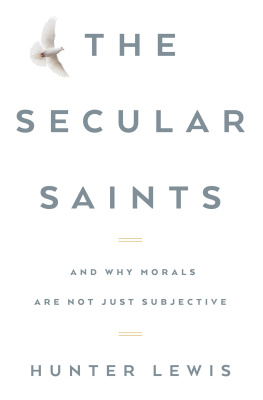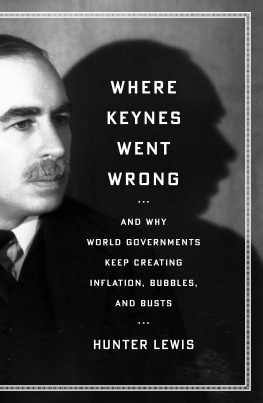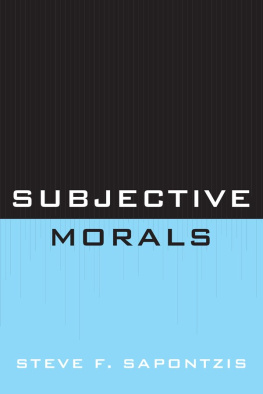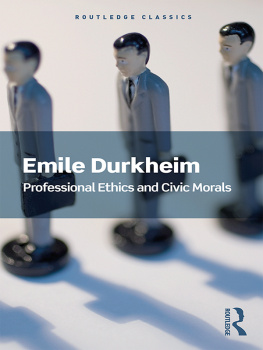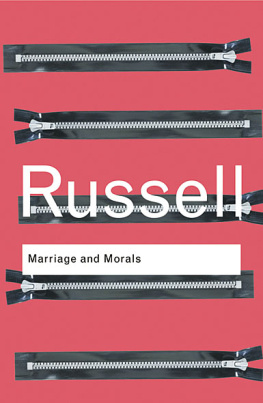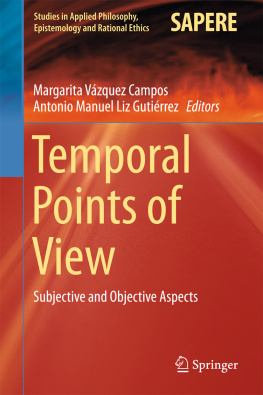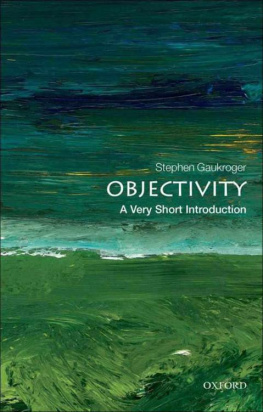The Secular Saints: And Why Morals Are Not Just Subjective 2018 by Axios Press. All rights reserved. Printed in the United States of America. No part of this book may be used or reproduced in any manner whatsoever without written permission except in the case of brief quotations used in critical articles and reviews.
Chapter 1
Are Morals Subjective?
W e all need food and water and shelter. But we also need to know where and how to direct our energies. We cannot function otherwise. And we need to believe we are making meaningful, not just random choices. This need is so paramount that individuals without answers will embrace anything, even the utter nihilism of terrorism, to fill the vacuum.
Religion has always helped provide answers to these questions and presumably always will. But even thousands of years ago, Greeks and Indians in particular were wondering what kind of answers, if any, could be found outside religion. If the answers come from outside revealed religion, they would have to come from our own heads. And since our brains function through some combination of emotion, intuition, sense experience, and logic, the answers would presumably have to come from those sources.
We all rely heavily on emotion to energize us, physically and mentally, but we also mistrust emotion. We know well enough that what we feel at this moment may not last long. Intuition is the mental mode we rely on the most for deciding and choosing, but it has the disadvantage of being so incommunicable to others.
In this day and age, we like factual observation and logic, and we especially like experimental science, which combines the two, because they make it so much easier to explain a conclusion to others. Isaac Newton, the great scientist, once told a colleague that something was true. When the colleague asked how he knew, Newton responded that he simply knew, but that given a day or two, he would be able to translate his knowledge into the language of fact and logic. And within a few days, he had his proof.
Given this background, it is natural for people to wonder if they might not be able to sort out moral, ethical, and related philosophical questions through some combination of intuition, fact, and logic, with the result that others would be able to understand and even accept their conclusions, without having to rely on religion and in particular revealed religion at all.
There have been many, many such attempts. Some of them were undertaken by people described in this book. That is not to say that everyone described in this book was trying to substitute human thought for religion or opposed religion in any way. Some of the people described in this book were atheists; others were devoted to their own version of religion; at least one was a very devoted Christian. Most were professional philosophers, but not all. Whatever their differences, none of them followed a religious vocation per se. They lived lives outside of organized religion, that is, they lived what might be called secular lives, whatever the religious linkages, and their thoughts and lives should be of potential interest to believers and non-believers alike.
But, returning to the central question, is it possible to establish a credible moral, ethical, philosophical system outside of religion? And, if so, what would it look like?
We might start to try to answer this question by pulling out some heavy ammunition from the great 18th-century British philosopher David Hume (17111776). Here are some particularly famous passages of his:
If we take in our hand any volume; of divinity or school metaphysics, for instance; let us ask, Does it contain an abstract reasoning concerning quantity or number? No. Does it contain any experimental reasoning concerning matter of fact and existence? No. Commit it then to the flames: for it can contain nothing but sophistry and illusion. ( An Inquiry Concerning Human Understanding )
It is obvious that ethics will never be developed as a branch of mathematics. So anyone who agrees with Humes point of view will have to try to develop it as a branch of the empirical/logical sciences. But Hume seems to say that this will not be possible either:
In every system of morality which I have hitherto met with, I have always remarked that the author proceeds for some time in the ordinary way of reasoning, and makes observations concerning human affairs; when of a sudden I am surprised to find that instead of the usual copulations of propositions is and is not, I meet with no proposition that is not connected with an ought or an ought not. This change is imperceptible, but is, however, of the [greatest] consequence. For as this ought or ought not expresses some new relation or affirmation, it is necessary that it should be explained; and at the same time that a reason should be given for what seems altogether inconceivable, how this new relation can be a deduction from others which are entirely different from it. ( An Inquiry Concerning Human Nature )
These few words of Humes, usually summarized as no ought from is, pose quite a challenge for a moral philosopher seeking to proceed without the support of religion. Immanuel Kant (17241804), often considered the greatest philosopher in history, said that Humes writings woke him from his metaphysical slumbers; he spent the rest of his life developing a rebuttal that featured logic as the prime, indeed the only reliable, instrument. Jeremy Bentham (17471832) did the same, but relied on sense experience and factual observation as the starting point for his logical deductions. Both of them shed a great deal of light on the issues, but both had their critics, as we shall see in their respective chapters.
By the end of the 19th century, the idea of subjectivism was steadily gaining ground. Nobody had any moral authority: neither religion nor philosophy, neither family nor friend could help us out. What might be good for me could very well be terrible for you, and there was really no reliable way to sort it out. We just had to make the best of it and hope to avoid complete nihilism. By the end of the 20th century, there had been decades of nihilism, which left hundreds of millions dead, but it seemed to be getting better. Perhaps human beings could agree after all. Then the global terrorist movement arrived. What would happen if one of these new nihilists got hold of weapons of mass destruction?
A hundred years ago, the subjectivists were not anticipating this future. They were feeling a sense of liberation. In throwing off Church and the strictures of their Victorian forebears, they thought they were pumping fresh air into a stuffy world and claiming new ground for personal liberty. They shrugged off charges that the new liberty was really a new libertinismso what if it were?
A Few Leading Subjectivists
T he philosophers who led the attack on traditional moral philosophy and its claims for objective truth were centered in Britain and included Ludwig Wittgenstein (18891951, Austrian, but taught in England and wrote, in part, in English), Bertrand Russell (18721970), Alfred J. Ayer (19101989), and the American Charles Stevenson (19081979). They had all been taught in academic cloisters where civilized people were assumed to agree on the basics. Since the basics were a given, moral philosophy could concentrate on such hot topics as: Should one shout in public to awaken a fainted man? Slow ones car at a major intersection while carrying an injured passenger to a hospital? Or return a borrowed book on time if its continuing possession might accomplish a useful purpose?

